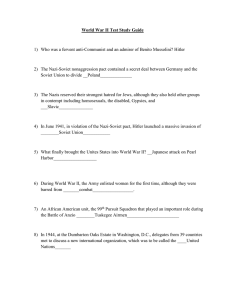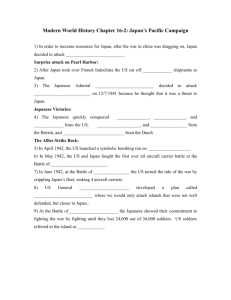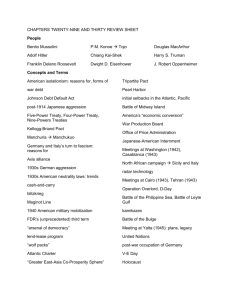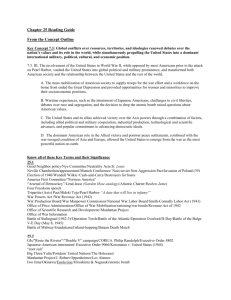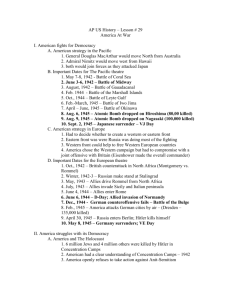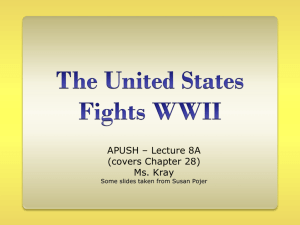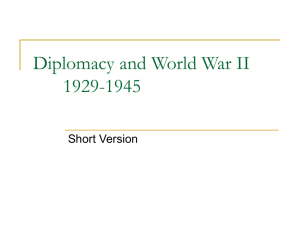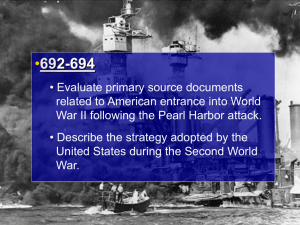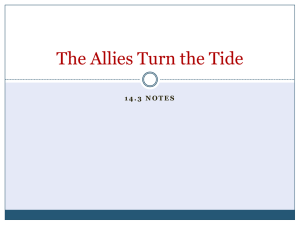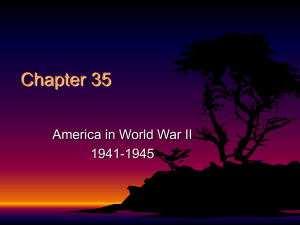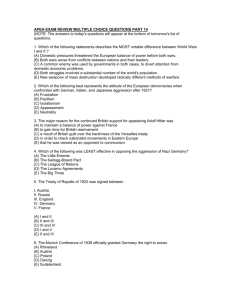THE PATH TO WORLD WAR II
advertisement
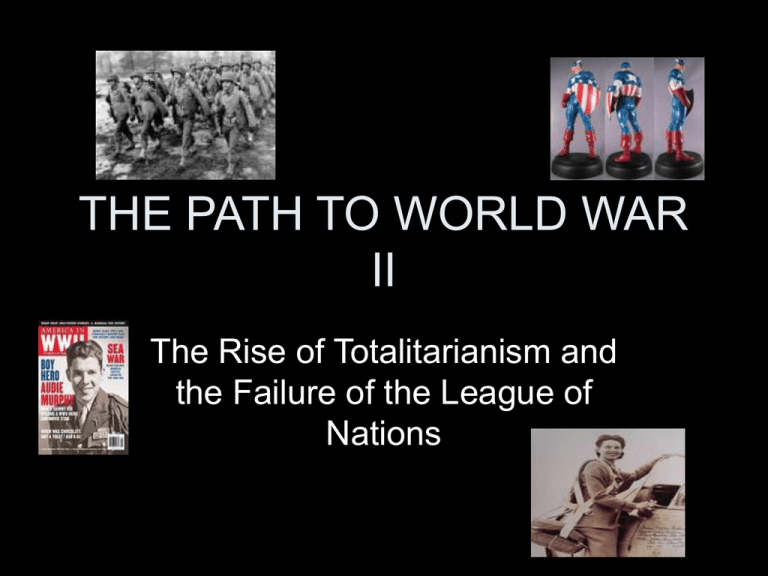
THE PATH TO WORLD WAR II The Rise of Totalitarianism and the Failure of the League of Nations Attempts to End War • League of Nations – Treaty of Versailles • Locarno Pact, 1926 • Washington Conference, 1921 – 5 Power Treaty – Japanese Advantage – Open Door reinforced • Kellogg-Briand Pact, 1928 – Pact of Paris – War illegal • War Debt and Reparations – Dawes Plan, 1924 – Hoover declares moratorium Path to War • American Foreign Policy in the 1930s – Good Neighbor Policy in Latin America • Removal of troops • Clark Memorandum (rebukes “Big Stick”) • Montevideo Conference – Cordell Hull, Sec. of State – London Conference • Confront global depression • FDR does not recognize gold standard – FDR Recognizes the Soviet Union • Ally against Japanese expansion in Pacific – Tydings-McDuffie Act • Date set for independence • Jones Act, 1916 Failure of the League of Nations • Italy, 1922 – Fascism and “Black Shirts” – Ethiopia and Albania, 1935 – Rome-Berlin Axis • Soviet Union, 1924 – Joseph Stalin, USSR – Non-Aggression Pact, 1939 • Japan, 1928 – Manchuria, 1931 • Hoover-Stimson Doctrine • Japanese leave League of Nations • American Oil, Pig Iron, and Steel • Germany, 1933 – Anschloss in Austria – Munich Pact (Appeasement) – Spanish Civil War, 1936 American Neutrality, 1935-1940 • Nye Committee – Businessmen benefit by war, “merchants of death” • Neutrality Acts, 1935,36,37 – Cash and carry, no arms, no credit/loans, no travel • “Quarantine Speech”, 1937 – Panay incident, pertains to aggressors • Neutrality Act of 1939 – Aid to Britain and France, weapons on “cash and carry” basis • Isolationism in America – Committee to Defend American By Aiding the Allies vs. America First (Fortress America) • Lend-Lease, 1941 – Destroyer-Bases Deal, 1940 – “Democratic countries”, “vital to defense of America” – Convoy System and American Neutrality Patrols • “Shoot on sight” • Atlantic Charter, 1940 (FDR and Churchill) “Greater East Asian Co-Prosperity Sphere” • End of Open Door in China, 1936 – Expansion into the Pacific • Rome-Berlin-Tokyo Axis, 1940 – American Oil Embargo on Japan • Tojo becomes Prime Minister, 1941 – Yamamoto’s Plan to gain Pacific territory • Attack on Pearl Harbor, Dec. 7, 1941 – “A date that will live in infamy” German and Italian Aggression • Invasion of Poland officially begins WWII, Sept. 1939 – Battle for France, 1940 – Battle of Britain (Sea Lion) • The American Home front – Selective Service Act, 1940 – OWM (Office for War Mobilization) • Oversaw production – War Production Board • Raw Materials – War Labor Board • “Rosie the Riveter” – Office of Price Administration (OPA) • Freeze on prices and rents • Ration coupons Results of War on Americans • Inflation less than 29% – Compared to WWI • Income Taxes – Required tax returns • National Debt – “welfare state” • Volunteerism – Bond drives • Smith-Connolly Antistrike Act, 1943 – Government controls strikes • OSRD (Scientific Research and Development) – Manhattan Project RACIAL DISCRIMINATION AT HOME • African-American Civil Rights Issues – Migration to northern factories • Detroit Riots – A. Philip Randolph • Sleeping Car Porters • March on Washington, – FEPC (Fair Employment Practices Committee) – NAACP • Membership grew – Adam Clayton Powell • Harlem Senator • Mexican Americans – Bracero Program – Zoot Suit Riots • Internment of Japanese – Executive Order 9066 – Issei vs. Nisei American Battles To Remember War in Europe, 1942-1945 North Africa, 1942 Operation Torch Invasion of Italy, 1943 Operation Husky Invasion of France, 1944 Operation Overlord, June 6, 1944 Battle of the Bulge, December 16, 1944 V-E Day, May 7, 1945 Battle of Berlin War in the Pacific, 1942 -1945 Battle of the Coral Sea, May 1942 Doolittle Raid, April 1942 Battle of Midway, June, 1942 Island Hopping, Nimitz, 1943 Battle of “Blood Island”, August 1943 Guadalcanal, Henderson Airfield Iwo Jima, February 1945 Japan within bombing distance Okinawa, April 1945 V-J Day, September 2, 1945
